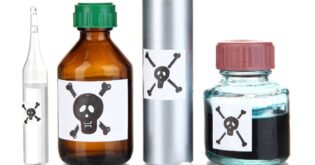March 17th–24th is National Poison Prevention Week
March 18, 2024 You may not know it, but household items like cleaning agents, prescription medications and pesticides can be dangerous to your two-legged and four-legged family members alike. Congress created National Poison Prevention Week, an annual, week-long awareness campaign, in 1961 to teach Americans about unintentional poisonings and how to safely store (as well as dispose of) household products that can unknowingly cause harm.
You may not know it, but household items like cleaning agents, prescription medications and pesticides can be dangerous to your two-legged and four-legged family members alike. Congress created National Poison Prevention Week, an annual, week-long awareness campaign, in 1961 to teach Americans about unintentional poisonings and how to safely store (as well as dispose of) household products that can unknowingly cause harm.
The Centers for Disease Control and Prevention (CDC) report that unintentional poisoning is one of the nation’s leading causes of injury and death. Many of these accidents result from unintentional ingestion of a prescription medication, pesticide, cleaning agent, or other type of household item. Here are some of the CDC’s important poisoning-related facts to familiarize yourself with:
- Over 300 hundred children and teens (ages 0 to 19-years-old) are treated in emergency room departments every day for poisoning
- On average, two individuals in the same age group die each day from the injuries they sustain from unintentional poisoning
- In the last two decades alone, the rate of unintentional poisoning has increased by more than 150%
- Approximately 90% of cases of accidental poisoning occur at home
- Accidental poisoning does not just include ingesting (or swallowing) a poisonous chemical, it can also occur when a hazardous substance is splashed in the eyes or on the skin, injected or inhaled
Exposure to a variety of different chemicals and hazardous substances can result in accidental poisoning. These substances and chemicals include bleach, antifreeze, carpet and upholstery cleaners, carbon monoxide, air fresheners, pain medications, pesticides, cosmetics and personal care products, foreign bodies like toys, thermometers, etc., and various types of alcohol. Some of the general symptoms of poisoning to watch out for include:
- Stomach pain
- Diarrhea
- Loss of appetite
- Fever
- Mental confusion
- Breathing difficulties
- Producing more saliva than usual
- Blue lips and skin (also known as cyanosis)
- Seizures
- Loss of consciousness
- Coma
If you or someone else is experiencing serious symptoms related to poisoning, like seizures, loss of consciousness, difficulty breathing, or more, call 9-1-1 right away. In the absence of severe symptoms, please call the Poison Control Center’s help line at 1-800-222-2222 for guidance.
Remember, some of the best ways to prevent accidental poisoning from happening start at home. Whenever possible, purchase small quantities of potentially dangerous household products and medications, dispose of unneeded extras, and keep all hazardous items out of reach of children by storing them in safe, childproof areas. If you have any questions or concerns about exposure to poisonous household or occupational chemicals, someone at our firm can help. To learn more, contact a representative online now.
Philadelphia Products Liability Lawyers at Galfand Berger, LLP, Representing Injured Victims Since 1947
If you have questions about filing a claim for injuries you sustained, contact the Philadelphia products liability attorneys at Galfand Berger LLP today. Call us at 800-222-USWA (8792) or fill out our online form for a free consultation. Located in Philadelphia, Bethlehem, Lancaster, and Reading, we serve clients throughout New Jersey and Pennsylvania, including Allentown and Harrisburg.
 Google Screened
Google Screened
